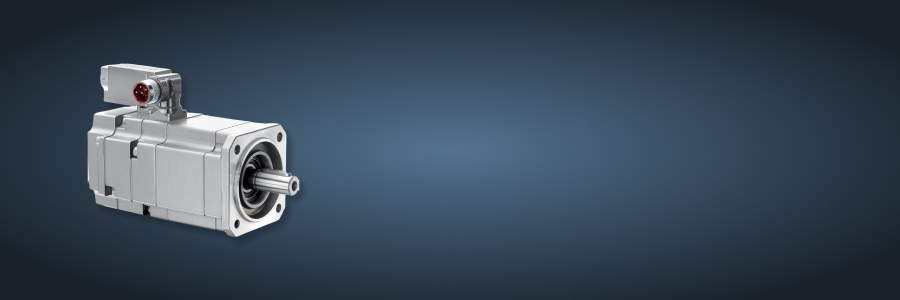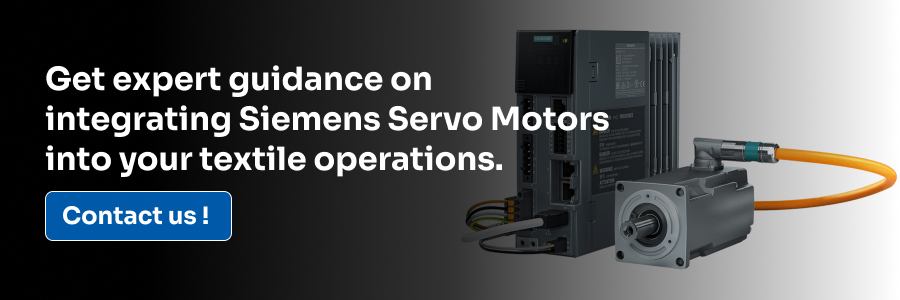The textile industry requires precise quality and consistent resource utilization. Manufacturers need automation solutions that are efficient, reliable and flexible as production speeds and customer expectations increase. Siemens Servo Motors supports these goals with superior motion control, low energy consumption and fast production cycles. This article discusses how Siemens servo motors improve textile machinery efficiency through automation, benefits over traditional motors, textile process applications, and sustainability.
Role of Siemens Servo Motors in Textile Automation
Automation in the textile industry is driven by the need to produce high-quality fabrics at low costs. Siemens Servo Motors meets these demands by providing precise motion control, high-speed operations, and smooth integration with textile machines.
How Servo Motors Differ from Traditional Motors
Unlike conventional Siemens motors, which run at a constant speed regardless of load, Siemens servo motors adjust speed and torque according to real-time machine requirements. This dynamic control increases the productivity of textile machines.
Key advantages of servo motors in textile automation:
- Positioning accuracy: Allows accurate fabric cutting, weaving and printing.
- Speed Variability: Changes motor speed with production demands and lowers mechanical stress.
- Power Efficiency: Uses only power when needed, lowering operating costs.
- Effortless Integration: It connects to Siemens PLCs plus other automation systems.
Using such features, Siemens Servo Motors reduces downtime, improves output quality and extends machine life.
Advantages of Siemens Servo Motors Over Conventional Textile Motors
Traditional induction Motors are widely used in textile manufacturing but lack the precision and flexibility of Siemens Servo Motors. Here’s why servo motors are the preferred choice in modern textile automation:
1. High Torque at Low Speeds
Textile machines need variable Speeds for different materials and processes. High-torque servo motors deliver good fabric handling and little wear on machinery.
2. Reduced Mechanical Wear and Tear
Unlike standard motors, which run continuously at a fixed speed, servo motors run only when required. Such intermittent operation reduces mechanical wear, so maintenance costs are low.
3. Intelligent Control and Feedback System
Servo motors have feedback on motor speed, position and torque. The machines use this information to self-correct errors, maintaining fabric consistency and reducing material waste.
4. Improved Energy Efficiency
Servo-driven systems such as Siemens V90 PN use 30% less Energy than textile motors. Optimizing power consumption enables manufacturers to reduce operational costs and support sustainable production processes.
Applications of Siemens Servo Motors in Textile Machinery
Siemens Servo Motors are applied at all stages of textile production, improving process efficiency and accuracy in critical processes.
1. Weaving and Knitting Machines
- Precision Fabric Tensioning: Ensures uniform fabric weaving and minimizes material defects.
- Speed Adjustments: Keeps optimal weaving speed despite fabric thickness.
2. Spinning and Yarn Processing
- Accurate Yarn Winding: Prevents thread breakage and material waste with accurate yarn winding.
- Synchronized Motion Control: For trouble-free spinning of various yarn types.
3. Fabric Printing and Dyeing
- High-Resolution Motion Control: Achieves intricate fabric patterns with consistent color application.
- Reduced Ink and Dye Wastage: Servo-driven machines optimize fluid usage for eco-friendly production.
4. Cutting and Sewing Machines
- Precision Cutting: Creates intricate fabric patterns with consistent color application.
- Dynamic Speed Control: It is adapted to various materials and reduces production errors.
By optimizing these processes, servo motors such as Siemens V90 PTO enable textile manufacturers to achieve higher production efficiency, lower cost and better product quality.
Also, Visit Siemens Servo Motor for Packaging and Material Handling: Optimizing Speed and Control
Contribution to Sustainable Textile Manufacturing
Sustainable textile manufacturing is a challenge for the textile industry. The V90 PN servo system supports eco-friendly practices in several ways:
1. Lower Energy Consumption
Traditional textile motors run at constant speeds and thus consume unnecessary energy. Servo motors use intelligent power management, reducing electricity usage and carbon emissions.
2. Reduction in Material Waste
Accurate motion control reduces fabric waste in weaving, cutting and printing. This results in large raw material savings and reduced production costs.
3. Extended Machine Life
Adapting speed and torque according to workload reduces mechanical wear, prolonging the service life of textile machinery and reducing the need for frequent replacement.
With these sustainability benefits, Siemens Servo Motors supports the textile industry in moving towards greener and more responsible manufacturing processes.
Why Siemens Servo Motors Are the Future of Textile Automation
The growing need for high-speed, low-energy and precision textile production makes Siemens servo motors an essential component of modern manufacturing. They adapt to changing production requirements, integrate with servo systems, and increase efficiency to keep textile businesses competitive in a dynamic industry.
Key Takeaways:
- Greater Precision: Errors in textile processing are eliminated.
- Higher productivity: Accelerates production without impacting fabric quality.
- Energy saving: Lower operating costs by using less power.
- Sustainable Benefits: Supports eco-friendly textile manufacturing.
Textile manufacturers can now future-proof their operations and increase efficiency in an automated world with the Siemens V90 PTO servo system.
Naksh Technology Solutions LLP: Your Trusted Automation Partner
In textile machinery, the adoption of Siemens Servo Motors has improved performance, reduced costs and supported sustainable manufacturing. Such sophisticated motors are suited for spinning, weaving, printing or cutting applications. Textile manufacturers looking for improved production quality and operational performance can consider Siemens Servo Motors for automation applications.
At Naksh Technology Solutions LLP, we are a high-end automation solutions provider of Siemens Motors, Servo Systems, PLCs, and industrial automation products. With more than 14 years of proven experience and our partnership with global industry leaders, our clients receive truly world-class automation solutions. Contact us today to discover how we can help you optimize efficiency with Siemens Servo Motors and other advanced automation solutions.
FAQs
Q1. Can Siemens Servo Motors be integrated with existing textile machinery?
A. Yes, Siemens Servo Motors is highly adaptable and can be seamlessly integrated into existing textile setups. They work efficiently with Siemens Servo Drive systems and PLC-controlled automation, enabling textile manufacturers to upgrade their machinery without major modifications.
Q2. Where can I buy genuine Siemens servo motors and automation components?
A. To ensure authenticity and product reliability, it’s best to purchase from an authorized Siemens Motor Dealer. Naksh Technology Solutions LLP is a trusted supplier, providing genuine Siemens electric motors, servo systems, and industrial automation solutions with expert guidance and after-sales support.
Q3. What are the main advantages of using Siemens Servo Drives in textile manufacturing?
A. Siemens Servo Drives enable precise motion control, ensuring accurate fabric tensioning, smooth weaving, and optimized material handling. Their fast acceleration and deceleration features improve cycle times, enhance machine performance, and extend the lifespan of textile machinery.

